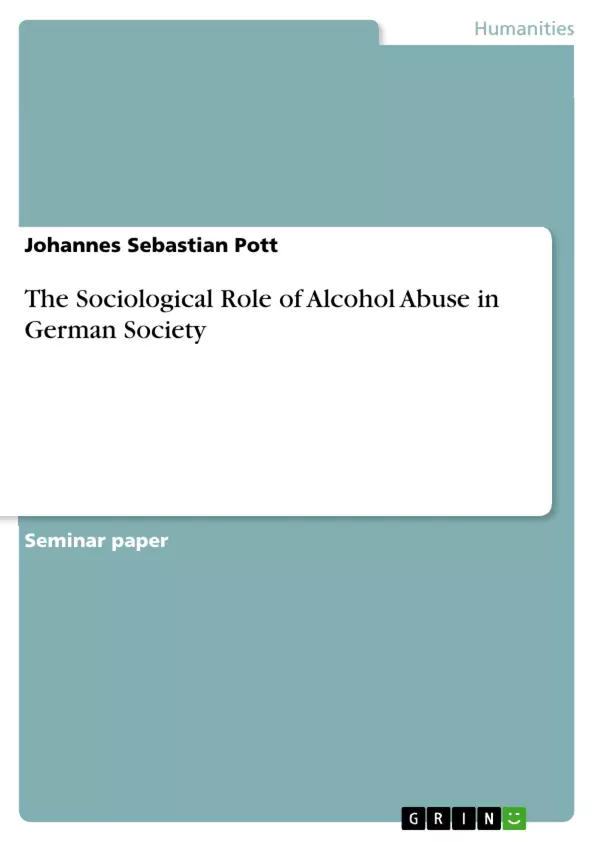In today's world, addictive disorders are becoming more and more important for society. There is an increasing number of people suffering from addiction and therefore a growing need for companies to deal with this issue. There are many different types of addiction, including not only dependence on substances, but also on gambling, communication and much more.
In this thesis, the topic of alcohol abuse in particular will be described in more detail and explained in more detail using the case study of personnel management at a university hospital. For this purpose, alcohol abuse in Germany will be explained in general at the beginning. In the further course of the work, findings from sociological theory will be applied to alcohol abuse.
Inhaltsverzeichnis (Table of Contents)
- Introduction
- Alcohol abuse in German society
- Alcohol abuse at the macro level
- Prevalence of alcohol abuse in different groups of people
- Influence of social factors on alcohol abuse
- Sociological role theory in the context of alcohol abuse
- The sociological theory of organization and alcohol abuse
- Conclusion
Zielsetzung und Themenschwerpunkte (Objectives and Key Themes)
This work aims to provide a detailed description of alcohol abuse, utilizing the case study of personnel management in a university hospital. It begins by examining the prevalence of alcohol abuse in German society, exploring trends, social factors, and demographics. Then, it delves into sociological theories, including role theory and organizational theory, to understand the context and impact of alcohol abuse.
- Prevalence and trends of alcohol abuse in Germany
- Social factors contributing to alcohol abuse
- Application of sociological theories to alcohol abuse
- The impact of social class and gender on alcohol consumption
- The role of alcohol in society and its historical context
Zusammenfassung der Kapitel (Chapter Summaries)
- Introduction: Introduces the topic of addiction, focusing on alcohol abuse and its societal impact. It sets the stage for the subsequent analysis of alcohol abuse in Germany.
- Alcohol abuse in German society: Provides an overview of alcohol consumption in Germany, including statistics on prevalence, mortality, and consumption trends across various demographics. It also examines the social acceptance of alcohol and the role of social pressure and expectations.
- Alcohol abuse at the macro level: Discusses alcohol abuse from a societal perspective, examining its historical context, cultural influences, and the role of social systems in shaping individual behaviors.
- Prevalence of alcohol abuse in different groups of people: Analyzes the prevalence of alcohol abuse across different groups, including social classes, genders, and age groups. It highlights the concern of rising alcohol consumption among adolescents.
Schlüsselwörter (Keywords)
This work focuses on the key concepts of alcohol abuse, addiction, social factors, sociological theories, role theory, organizational theory, prevalence, trends, and historical context. It explores the interplay of these concepts in understanding alcohol abuse in German society.
Frequently Asked Questions
What is the sociological focus of this thesis?
The thesis applies sociological theories, such as role theory and organizational theory, to understand alcohol abuse within German society and institutional settings.
How prevalent is alcohol abuse in Germany?
The work provides statistics on prevalence and mortality, noting trends across different demographics and the social acceptance of alcohol in Germany.
What case study is used in the research?
The research uses the case study of personnel management at a university hospital to explain how organizations deal with alcohol abuse.
Does social class affect alcohol consumption?
Yes, the thesis analyzes how social factors, including social class and gender, influence patterns of alcohol consumption and abuse.
Why is alcohol abuse a concern for companies?
With an increasing number of people suffering from addiction, there is a growing need for companies to address these issues within their personnel management.
What is the impact of social pressure on drinking?
The work examines how social expectations and cultural influences shape individual behaviors regarding alcohol use at a macro level.
- Citar trabajo
- Johannes Sebastian Pott (Autor), 2011, The Sociological Role of Alcohol Abuse in German Society, Múnich, GRIN Verlag, https://www.grin.com/document/1166605



